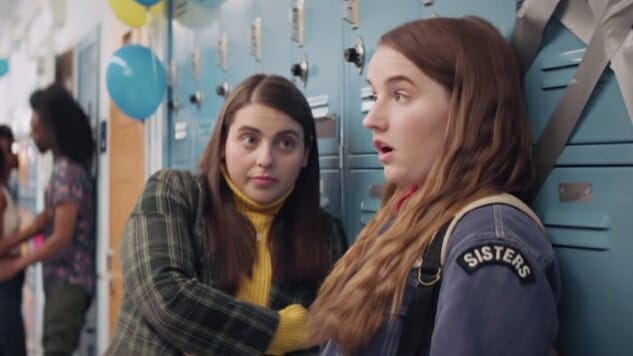Booksmart

Booksmart, the directorial debut of Olivia Wilde, is another journey down the halls of a wealthy high school days before graduation, but it’s different enough to be endearing. Written by an all-female writing team including Susanna Fogel, Emily Halpern, Sarah Haskins and Katie Silberman, the script centers on life-long besties Amy (Kaitlyn Dever) and Molly (Beanie Feldstein) as they attempt to party one time before the end of high school. Wilde and company draw from a whimsical, rainbow palate to explore friendship at diverging roads. It’s an instant classic.
Wilde has been on set since she was a teenager, and it’s clear she’s been studying the entire time. Her cast consists of young Hollywood royalty who, presumably, also learned from their time on set. Feldstein (the younger sister of Jonah Hill), co-stars Mason Gooding (Cuba Gooding Jr.’s son), and Billie Lourd (daughter of the late Carrie Fisher) all give career-launching performances. Wilde’s lens, coupled with the cinematographer Jason McCormick’s eye, steadily reveals the inner landscapes of the ensemble cast. Lourd’s Gigi reveal comes in slow-motion. She spills out of her lowrider like Beyoncé in the “Formation” video, shaking her long golden locks and completely enmeshed with the moment, and the feeling of being alive.
In a similar scene exploring body image and the modern teenage girl, Amy and Molly envision themselves as Barbie Dolls while they are tripping. They lament the loss of their genitalia and marvel at their huge breasts. Feldstein and Dever shine as an odd couple. Molly wants to be the youngest person ever elected to the Supreme Court, while Amy seeks to discover what possibilities life may open up for her. Easily feeding off of one another’s energy, they’re a comedy duo I wouldn’t mind seeing in another setting. Like any almost perfect couple, their problem boil down to communication. The script slowly reveals this through Amy’s hesitation in the shadow of Molly’s self-assured thrill-seeking. Each of the girls’ actions links back to their individual insecurities.
In another key visual moment, Amy swims in her underwear between the student bodies hovering above the water. No longer cowering, she is relaxed and smiling for the first time in the film. Like a side scroller videogame, she swims the length of the pool, distinguishing the shot from the rest of the visual landscape. Dever’s reserve is evenly measured. Broken down until only the truth comes out, the fury she unleashes surprises and then enrages Molly. The chaos of repressed anger and things unsaid between a co-dependent duo isn’t the end of the film. It’s the crux. Unlike most teen films that center on a romance, Amy and Molly are the most important couple in the movie.
-

-

-

-

-

-

-

-

-

-

-

-

-

-

-

-

-

-

-

-

-

-

-

-

-

-

-

-

-

-

-

-

-

-

-

-

-

-

-

-








































